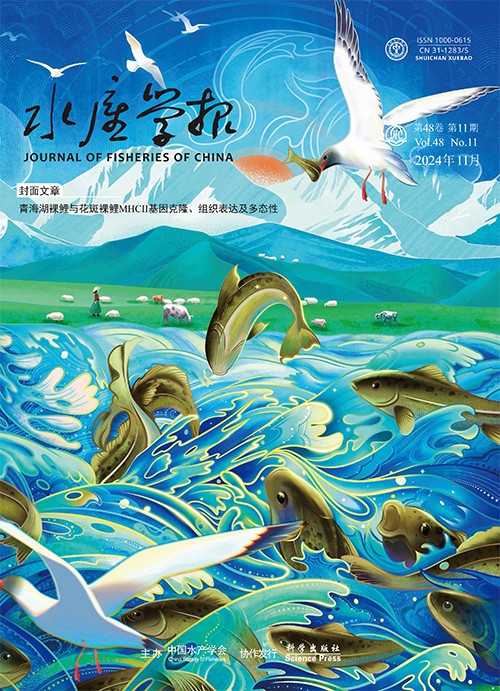Effect of temperature on the virulence of Streptococcus agalactiae from Nile tilapia(Oreochromis niloticus)
Q4 Environmental Science
引用次数: 3
Abstract
In order to understand the influence and mechanism of temperature on the virulence of Streptococcus agalactiae,the effects of culture temperature on the virulence related parameters of S. agalactiae including bacteria grow th,adhesion,invasion,expression of virulence genes and mortality rates of tilapia w ere studied. The results show ed that the grow th speeds of S. agalactiae at different temperatures( 25-40 ℃) were different; 37 ℃ was the optimum growth temperature and the slowest growth speed appeared at 25 ℃. The adhesive capacity of S. agalactiae reached the peak at 37 ℃ and decreased at 40 ℃. There w as no significant difference betw een the absorbance( OD 590 nm) of adhesive S. agalactiae incubated in the range of 25- 34 ℃. The number of colony forming units in the brain of tilapia infected artificially w ith S. agalactiae show ed a temperature-dependent grow th pattern. The number of colony forming units increased along w ith the increase of culture temperature and reached the peak at 37 ℃,and then decreased at 40 ℃. The number of colony forming units w as positively associated w ith its mortality rate. The expression of virulence genes w as also influenced by culture temperature. The expression level of hly and cfb genes show ed a temperature-dependent expression pattern similar to the number of colony forming units. The expression of hly and cfb genes significantly increased and reached the peak at 34 ℃ and 37 ℃,respectively,and then dropped rapidly w hile the culture temperature continued to rise. The expression of sip gene w as minimally influenced by culture temperature w hile the expression of scpB gene decreased along w ith the increase of the culture temperature. The mortality rates of tilapia infected w ith S. agalactiae cultured at different temperatures show ed temperature-dependence. The mortality rate increased along w ith the increase of culture temperature and peaked 66. 67% ± 6. 67% at 37 ℃,and then slightly decreased at 40 ℃. In conclusion,the culture temperature influenced the grow th,adhesion,invasion and expression of some virulence genes of S. agalactiae,w hich may contribute to its virulence.温度对尼罗罗非鱼无乳链球菌毒力的影响
为了解温度对无乳链球菌毒力的影响及其作用机制,研究了培养温度对无乳链球菌毒力相关参数(细菌生长、粘附、侵袭、毒力基因表达及罗非鱼死亡率)的影响。结果表明:不同温度(25 ~ 40℃)下无乳链球菌的生长速度不同;37℃为最适生长温度,25℃为生长最慢温度。无乳链球菌的黏附力在37℃时达到峰值,在40℃时下降。在25 ~ 34℃范围内,无乳链球菌的吸光度(OD值590 nm)无显著差异。人工感染无乳链球菌后,罗非鱼脑内菌落形成单位数量呈温度依赖性生长模式。菌落形成单位数量随培养温度的升高而增加,在37℃时达到峰值,在40℃时下降。菌落形成单位的数量与其死亡率正相关。毒力基因的表达也受培养温度的影响。hly和cfb基因的表达水平与菌落形成单位的数量相似,表现出温度依赖的表达模式。hly和cfb基因的表达量显著增加,分别在34℃和37℃达到峰值,随后随着培养温度的继续升高迅速下降。sip基因w的表达受培养温度的影响最小,而scpB基因的表达随培养温度的升高而降低。不同温度培养的无乳链球菌感染罗非鱼的死亡率表现出温度依赖性。死亡率随培养温度的升高而升高,最高达66。67%±6。37℃时为67%,40℃时略有下降。综上所述,培养温度影响了无乳链球菌的生长、粘附、侵袭及部分毒力基因的表达,可能与无乳链球菌的毒力有关。
本文章由计算机程序翻译,如有差异,请以英文原文为准。
求助全文
约1分钟内获得全文
求助全文
来源期刊

水产学报
Environmental Science-Management, Monitoring, Policy and Law
CiteScore
1.40
自引率
0.00%
发文量
5213
期刊介绍:
"Fisheries of" mainly reflects the results of scientific research and development of the direction of aquaculture for domestic and foreign academic exchanges Fisheries Service. Mainly basic research published in Fisheries, aquaculture and proliferation of fishing waters environmental protection, preservation of aquatic products processing and utilization, fishing equipment, and other aspects of mechanical papers, research briefings and reviewed.
 求助内容:
求助内容: 应助结果提醒方式:
应助结果提醒方式:


